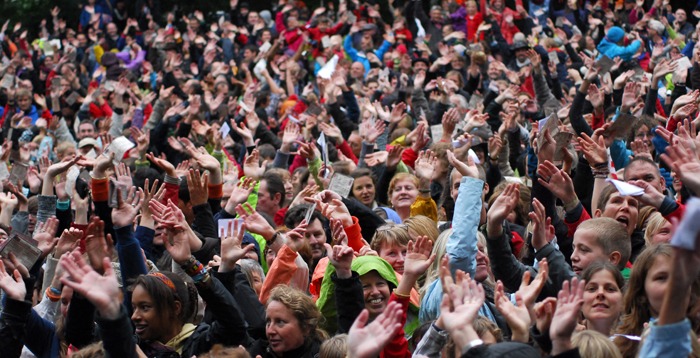This weekend, tens of thousands of people took part in Sing for the Climate, a mass sing-along organised by Friends of the Earth Flanders and other groups in the Belgian Climate Coalition to raise awareness about climate change. Sing for the Climate is part of the on-going Big Ask campaign for strong climate laws.
Estimated at over 80,000, participants all across Belgium, in 180 different locations, sang ‘Do it now’ on Saturday and Sunday. A special version of ‘Do it now’ has been adapted by Belgian rockstar Stef Kamil Carlens from the Italian song ‘Bella Ciao’, and recorded by more than 50 Flemish artists.
Film director Nic Balthazar, the driving force behind the Sing for the Climate initiative, will be editing together footage recorded over the weekend, making a video to circulate ahead of November’s UN climate summit in Doha, Qatar.
The level of particiaption in Sing for the Climate was outstanding, with over three times as many people as the last Big Ask event, Dance for the Climate, in Ostend. With such a massive turnout, there is hope that, with this video, politicians can be reminded of how many people are deeply concerned about climate change and that not enough is been done by our public representatives.
The Sing for the Climate campaign argues that climate change isn’t just a problem that will only present itself in the future, but is having disastrous effects right now. 300,000 people are dying annually from climate-change-related catastrophes like storms, droughts, floods and food-shortages. It is predicted that 100 million people could die because of climate change by 2030 if serious action is not taken. The majority of those who suffer as a consequence of climate change are from the global south, have contributed the least to carbon emission levels, and are the least able to adapt to climate chaos.
Sing for the Climate shows that the Belgian public want their representatives to take action and lead the way in Europe by introducing stronger climate laws. Massive moves need to be made to reduce carbon emissions by increasing energy efficiency, reducing waste, changing energy supplies to low-carbon and carbon-neutral sources, if global warming is to be kept under 2 degrees Celsius – considered to be the threshold beyond which climate change would almost certainly be apocalyptic.






